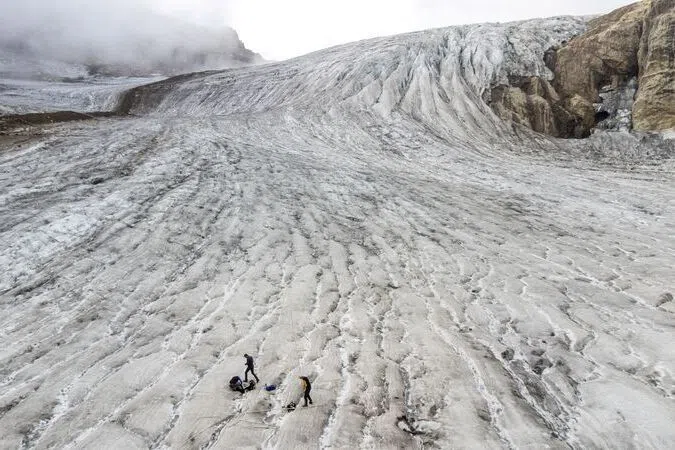Switzerland’s ‘dying’ Gries Glacier melting at an alarming pace
Sign up now: Get ST's newsletters delivered to your inbox

Switzerland’s Gries Glacier, in the southern canton of Valais, is 3.2km shorter than it was in 1880.
PHOTO: REUTERS
Follow topic:
OBERGOMS, Switzerland – Switzerland’s 5.4km-long Gries Glacier, a focal point for research, is retreating at an alarming pace as climate change accelerates an unprecedented ice melt across the country, the Swiss glacier monitoring service said.
“This is a dying glacier,” said Dr Matthias Huss, director of Glacier Monitoring Switzerland (Glamos), noting the depth of the ice was reduced by 6m in the 12 months to September 2025 alone.
Between 2000 and 2023, the glacier, in the southern canton of Valais, was reduced by 800m in length. Today, it is 3.2km shorter than it was in 1880, with an average ice thickness of 57m.
The grim reality of rapid glacier melt was seen in May 2025, when a catastrophic glacier collapse destroyed the village of Blatten, also in the canton of Valais.
Dr Huss blamed the melting of Gries Glacier on the consecutive dry years of 2022 and 2023, and a warm 2025 summer, despite momentary relief coming from heavy snowfall in mid-April 2025.
“We would need much more snow to counteract the effect of the very warm summers. And this summer of 2025, again, was much too warm,” Dr Huss stated.
At its lower points, the glacier could melt within five years, he said, whereas at altitudes of around 3,000m, it will take some 40 years to 50 years for it to disappear.
About one hundred glaciers have vanished between 2016 and 2022 in Switzerland, according to Glamos.
Since the 1990s, ice loss has increased in nearly all regions around the world, mainly due to stronger summer melting, according to a new report by the World Meteorological Organisation. It found, for the third year in a row, every glaciated region on earth reported ice loss. REUTERS

